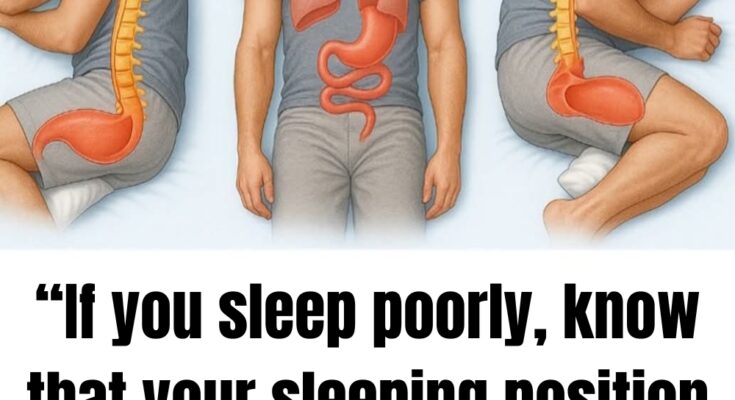Every night, the same scene repeats itself: you settle into bed, close your eyes, and hope for a peaceful sleep. Maybe you sleep on your back, on your side, curled up, or on your stomach.
But have you ever thought that the way you sleep could explain your morning aches, restless nights, or that constant fatigue that never goes away?
Sleep isn’t just about “turning off” your body—it’s the moment when it repairs and reorganizes itself. And if you adopt the wrong posture, this process can be disrupted, even without obvious signs at first.
When Your Body Sends Warning Signals
-
Loud snoring
-
Morning headaches
-
Heartburn
-
Shortness of breath at night
-
Feeling tired even after 8 hours of sleep
Often, we blame stress or the mattress, but the sleeping position may be the real culprit.
Sleeping on Your Left Side: Proven Benefits
This is not just a yogic recommendation. Sleeping on your left side can:
-
Improve digestion
-
Reduce acid reflux
-
Enhance lymphatic circulation
-
Support blood flow during pregnancy (recommended for expectant mothers)
Sleeping sideways also boosts the glymphatic system, which “cleans” brain waste overnight and may reduce the risk of neurodegenerative diseases like Alzheimer’s.
Other Sleeping Positions and Their Effects
-
On your back: Good for spinal alignment, but worsens snoring and sleep apnea, reducing oxygen intake.
-
On your stomach: Compresses organs, twists the neck, and hinders breathing—leading to chronic pain risks.
-
On your right side: Better than stomach sleeping, but may worsen reflux and overload the liver.
Age and Sleeping Position
-
Babies: Should always sleep on their backs to reduce the risk of Sudden Infant Death Syndrome (SIDS).
-
Adults 60+: Avoiding back-sleeping may help minimize sleep apnea episodes.
Real-Life Stories
-
Ekaterina, 34: Suffered from heartburn after pregnancy. Switching to side sleeping brought quick relief.
-
Anatoly, 57: Diagnosed with sleep apnea, reduced his episodes by 70% after adopting side sleeping with an orthopedic pillow.
5 Sleep Myths You Should Forget
-
Sleeping on your back is always best — not for everyone.
-
Sleeping on your stomach aids digestion — actually, it does the opposite.
-
Ergonomic pillows are useless — they can transform your sleep.
-
Snoring is just noise — it may signal sleep apnea.
-
You can “catch up” on sleep during weekends — it doesn’t work that way.
⚡ Fun fact: Research shows that people who sleep on their side have better brain fluid drainage—a process that only happens fully during deep sleep.
Simple Tips for Better Sleep Tonight
-
Place a pillow between your knees to relax your lower back.
-
Elevate the head of your bed slightly to reduce reflux.
-
Use nasal strips if you suffer from nighttime congestion.
-
Choose a mattress with balanced support.
-
Start the night in the right position, even if you change later.
FAQ
What’s the best position to avoid reflux?
Sleeping on your left side reduces symptoms and improves digestion.
Is sleeping on your back bad?
Not necessarily, but it can worsen snoring and sleep apnea.
Does stomach sleeping hurt your spine?
Yes, it strains the neck and misaligns posture.
Can I train myself to sleep on my side?
Yes, with the right pillow adjustments and support between the legs.




